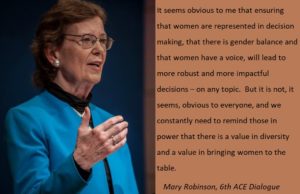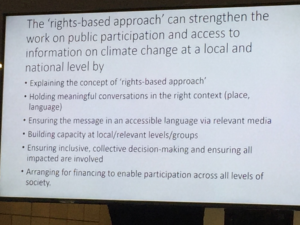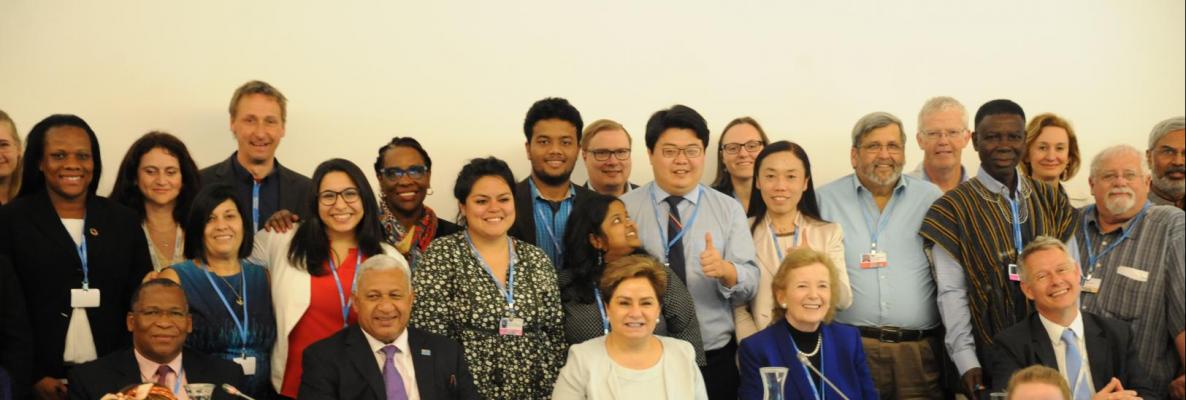The 6th Dialogue on Action for Climate Empowerment (ACE) took place on the 8th and 9th of May in Bonn, Germany. The Subsidiary Body for Implementation organises annual in-session Dialogues on ACE to enhance work in the areas of climate change education, training, public awareness, public participation and public access to information. The Gender Action Plan adopted at COP 23, mandated a focus on the gender dimensions of ACE and requested that this be included in the focus of this year’s ACE dialogue.
 Mary Robinson participated in the formal opening of the Dialogue on the first day in the company of the COP23 President, Prime Minister Bainimarama of Fiji and Patricia Espinosa, Executive Secretary of the UNFCCC, and gave a key note address on the second day when the focus was on public participation. In her speech she stressed the role of human rights in strengthening the core ACE actions of access to information, education and participation and emphasised the importance of enabling the meaningful participation of grassroots women in climate action. In her speech Mrs Robinson stressed that “participation can only enrich our discussions and decision making. We must remember that in sharing power – we do not cede power”.
Mary Robinson participated in the formal opening of the Dialogue on the first day in the company of the COP23 President, Prime Minister Bainimarama of Fiji and Patricia Espinosa, Executive Secretary of the UNFCCC, and gave a key note address on the second day when the focus was on public participation. In her speech she stressed the role of human rights in strengthening the core ACE actions of access to information, education and participation and emphasised the importance of enabling the meaningful participation of grassroots women in climate action. In her speech Mrs Robinson stressed that “participation can only enrich our discussions and decision making. We must remember that in sharing power – we do not cede power”.
The three actions she proposed were echoed in the discussion and breakout groups: i) to appoint a human rights focal point in the UNFCCC secretariat; ii) to place human rights at the core of ACE activities; and iii) for state and non-state parties to include men and women from local communities in their delegations so that their lived experience can inform discussions in the UNFCCC. Senegal and Ireland took the floor to support the idea of a human rights focal point in the secretariat – stating that this was particularly timely as Parties move towards the implementation of NDCs.
Martin Frick, Senior Director for Policy and Programme Coordination in the UNFCCC Secretariat, stressed the value of participation in contributing to more ambitious climate action and Ben Schachter, the Human Rights Officer from the Office of the High Commissioner for Human Rights emphasised that participation is a human right that contributes to better climate outcomes.
Feedback from the breakout groups which included delegates, youth, science communicators, UN agencies, grassroots and indigenous women and civil society stressed the need for bottom up climate action co-created and delivered in a way that empowers people to play their role. The need for funding and capacity building to enable the meaningful participation of children, youth and women was emphasised, as was the need to provide access information tailored to different audiences. In wrapping up, co-facilitator of the Dialogue, Paulo Jose Chiarelli from Brazil, recalled Mary Robinson’s reference to Etrida Luhanga, a small holder farmer in Malawi who spoke at the closing of an international conference of 300 people, saying “…you have to listen to me because I have experience – what I know isn’t written in your papers”. He stressed the benefits of indigenous and traditional knowledge especially when combined with scientific knowledge and tools.
which included delegates, youth, science communicators, UN agencies, grassroots and indigenous women and civil society stressed the need for bottom up climate action co-created and delivered in a way that empowers people to play their role. The need for funding and capacity building to enable the meaningful participation of children, youth and women was emphasised, as was the need to provide access information tailored to different audiences. In wrapping up, co-facilitator of the Dialogue, Paulo Jose Chiarelli from Brazil, recalled Mary Robinson’s reference to Etrida Luhanga, a small holder farmer in Malawi who spoke at the closing of an international conference of 300 people, saying “…you have to listen to me because I have experience – what I know isn’t written in your papers”. He stressed the benefits of indigenous and traditional knowledge especially when combined with scientific knowledge and tools.
Ovais Sarmad, Deputy Executive Secretary UNFCCC, closed the Dialogue, and reflected that more needs to be done “to bring the information to the lowest level and to recognise that we in the multilateral system don’t do that very well. It is not enough to share information. We must make it meaningful”.


